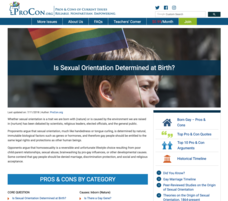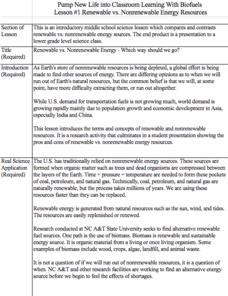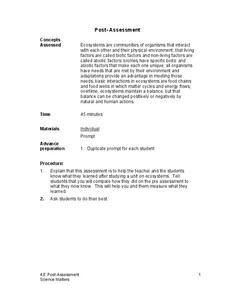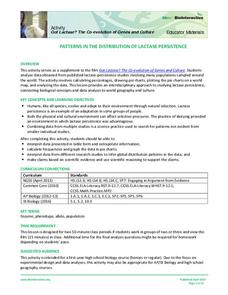Chicago Botanic Garden
Faces of Climate Change
Sometimes, the best solution to a problem can be found by walking in someone else's shoes. Here, scholars use character cards to take on the roles of people around the world. They determine how their character's life affects our...
PBS
Technology: Conveniences and Consequences
It's a delicate balance—using technology to improve our lives while still protecting the environment, and ourselves, from the hazards of technology use. Class members examine statistics about the increase in media use, complete a survey...
Curated OER
Born Gay
Is a person's sexual orientation determined at birth? With the informative website, scholars prepare for a debate about the topic. They learn the top pro and con arguments and read through a historical timeline of homosexuality. They...
Chicago Botanic Garden
Faces of Climate Change
How does climate change affect you? First in a three-part series, the activity focuses on how individuals living around the world are affected by climate change. Individuals take on the role of a given character and share their...
Kenan Fellows
Sustainability: Learning for a Lifetime – The Importance of Water
Water is essential for life—and understanding the importance of clean drinking water is essential in understanding sustainability! Show your environmental science class the basics of water testing and treatment through a week-long...
K12 Reader
Endangered Species
Your learners have likely heard about animals going extinct. By reading this passage, they can find out some reasons why this happens and how to protect endangered species. After reading, individuals respond to five related questions.
Chicago Botanic Garden
Calculating Your Carbon Footprint
Unplugging from technology for one day per week will decrease your carbon footprint—are you up to the challenge? Part two in a series of three allows individuals to explore their personal carbon footprints. By first taking a quiz at home...
Chicago Botanic Garden
Personal Choices and the Planet
The last activity in the series of four has individuals determine steps they can take to reduce their carbon footprints and then analyze their schools' recycling programs. Through a sustainability audit, they identify how and where their...
Chicago Botanic Garden
Personal Choices and the Planet
How big is your footprint? Activity three culminates the series by having groups complete carbon footprint audits with people in their schools and/or around the districts. Groups then gather their data, create a presentation including...
Kenan Fellows
Making Connections with Water Quality
What's in your water? And, why is water quality so important? Enhance your class's level of water appreciation through a lesson that demonstrates the necessity of water quality. Environmental enthusiasts explore the EPA's Clean Water...
Kenan Fellows
Renewable vs. Nonrenewable Energy Resources
Is one type of energy inherently good or bad? Young scientists explore energy resources in a week-long unit. After extensive research, groups create powerful position statements and presentations supporting their energy resource of choice.
Population Connection
The Peopling of Our Planet
How many people live on the planet, anyway? The first resource in a six-part series covers the topic of the world population. Scholars work in groups to conduct research and make population posters after learning about the global...
Curated OER
Hazards: Fifth Grade Lesson Plans and Activities
After comparing earthquake and volcanic hazards to one another, fifth graders take a closer look at damage associated with a volcanic eruption. They then create a simulation of mudslides due to a volcanic eruption. Using different...
Chicago Botanic Garden
Accessing Prior Knowledge: Global Climate Change Survey
Begin a unit on weather and climate change by assessing prior knowledge of the topic. Learners respond to a survey with questions that ask what they think causes climate change, the effects of climate change, and if it is important to...
Population Connection
The Carbon Crunch
Carbon is in the air; should we care? Teach the class why it is important to pay attention to carbon levels and how the world population and various countries across the globe affect the carbon levels in the atmosphere. High schoolers...
Council for Economic Education
The Economics of Income: If You’re So Smart, Why Aren't You Rich?
If basketball players make more than teachers, why shouldn't learners all aspire to play in the NBA? Unraveling the cost and benefits of education and future economic success can be tricky. Economic data, real-life cases, and some...
Curated OER
Hazards: Second Grade Lesson Plans and Activities
Equip learners with safety knowledge in the case of an earthquake. After coloring the places to go to get help after a quake, and label places that wouldn't be safe to go after a quake, young geologists simulate three levels of...
Louisiana Department of Education
Hatchet
Accompany a novel study of Hatchet by Gary Paulson with a unit consisting of 16 lessons focused on physical and emotional survival. Reading the story along with a variety of informational texts, scholars compare and contrast reading...
Seussville
The Lorax's Earth Day
Add a touch of Dr. Seuss whimsy to your Earth Day celebration with six pages consisting of Earth-friendly, inspiring, and engaging activities designed to enhance the beauty of your school campus and showcase the famous story, The Lorax.
Science Matters
Ecosystem Pre-Assessment
Test scholars' knowledge of ecosystems with a 20-question pre-assessment. Assessment challenges learners to answer multiple choice questions, read diagrams, and complete charts.
Science Matters
Post-Assessment
Twenty questions make up an assessment designed to test super scientists' knowledge of ecosystems. Scholars answer multiple-choice and short-answer questions about organisms, food chains, energy flow, and more.
Howard Hughes Medical Institute
Patterns in the Distribution of Lactase Persistence
We all drink milk as babies, so why can't we all drink it as adults? Examine the trend in lactase production on the world-wide scale as science scholars analyze and interpret data. Groups create pie charts from the data, place them on a...
Kenan Fellows
Electricity: Sources, Usage, Challenges, and the Future
What does the future of energy look like? Junior engineers collaborate to discover a solution to the global energy crisis during a very hands-on instructional activity. The unit focuses on learning through collaboration to develop a deep...
Curated OER
EU and Turkey
Should Turkey be admitted to the European Union? Before debating this question, class members research the background and stated purpose of the EU, read articles of Turkey's bid to become a member of the EU, and the concerns other...
Other popular searches
- Philosophy of Human Nature
- Democracy and Human Nature
- Essays on Human Nature
- Human Nature Hobbes
- Human Nature Good
- Enlightenment Human Nature
- Human Nature in Plays
- Human Nature Environmental
- Poetry on Human Nature
- Aristotle Human Nature
- Human Nature Enviromental

























